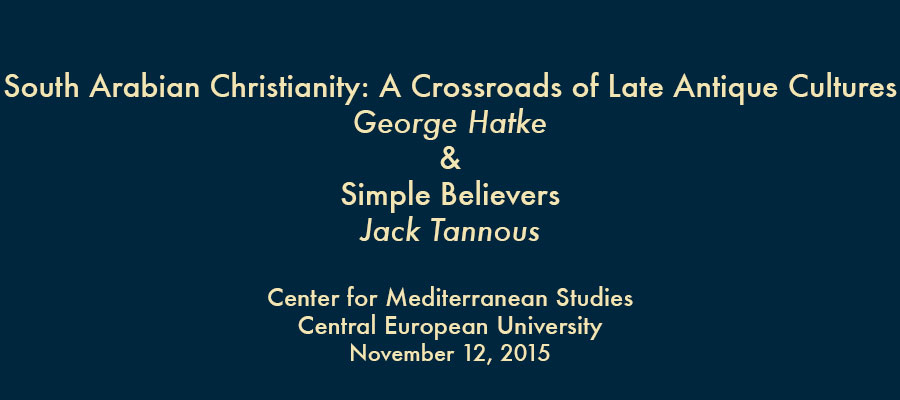South Arabian Christianity, lectures by George Hatke (University of Vienna) and Jack Tannous (Princeton University), CEMS, CEU, November 12, 2015, 5:30–9:00pm
The Center for Religious Studies and the Center for Eastern Mediterranean Studies host a special dual lecture given George Hatke (University of Vienna) and Jack Tannous (Princeton University).
South Arabian Christianity: A Crossroads of Late Antique Cultures
Christianity was first introduced to South Arabia in the mid-fourth century by a Roman mission. Christian and Jewish relations in South Arabia were complex. On one hand, both groups used similar religious vocabulary in their inscriptions. On the other, Christians were targets of periodic persecution by ruling elite, which in the fifth century came to side with the Jews. South Arabian Christianity dwindled with the expansion of Islam, but survived even as late as the sixteenth century on the island of Soqoṭrā.
George Hatke is senior lecturer at the Institute of Oriental Studies at the University of Vienna. He teaches Ancient South Arabian languages, the history and culture of ancient South Arabia, and Arabic. He received his PhD from the Department of Near Eastern Studies at Princeton University and was a post-doctoral lecturer at the Institute for the Study of the Ancient World at New York University.
Simple Believers
Between the fourth and seventh centuries, the Middle East’s Christian community fragmented into competing churches based on disagreements over theological speculation about the mechanics of the Incarnation. Yet the population of the region lacked the theological formation to properly understand the issues that defined these rival ecclesiastical groups. To fully understand the religious landscape of the Middle East on the eve of the Islamic conquests, the consequences of this tension between an illiterate, rural population and communal definition based on sophisticated theological disagreement need to be taken into account.
Jack Tannous is Assistant Professor of History at Princeton University. He teaches Late Antiquity and his research focuses on Syriac- and Arabic-speaking Christian communities of the Middle East, Greco-Syriac and Greco-Arabic translation, Christian-Muslim relations, and the transition from Roman to Arab rule.
